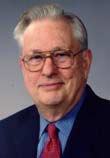The Conduct Of Science Is Not What It Used To Be
Arden Bement
Director, NIST; Acting Director, NSF
About the Lecture
In science today, new research and computational tools are turning the old adage-“The eye can’t see what the mind cannot perceive”-on its head. New ways of conducting research, catalyzed by the information revolution, are harvesting unprecedented observations that are a challenge to perceive and to understand. We are on the verge of gaining much deeper insight into phenomena on scales from sub-atomic to the universe, exploring Earth processes in greater depth, and being able to address national problems with an integrated, systems approach. At the same time, the dramatic confluence of scientists into interdisciplinary teams that span the globe, and the consequent cross-pollination of disciplines, underscore that complex challenges have hastened a different way of working. Embedded sensors in large grids; synthesis of massive databases; computational models of complex behavior; international collaborations of scientists—such new modes of conducting science are now the norm in studying earthquakes, ecological systems, oceans, and even gravitational waves.
About the Speaker

ARDEN L. BEMENT, JR. became the Director of the National Institute of Standards and Technology (NIST) on December 7, 2001. On February 22, 2004, he also became the Acting Director of the National Science Foundation. Before coming to NIST, he served as the David A. Ross Distinguished Professor of Nuclear Engineering and head of the School of Nuclear Engineering at Purdue University. He also had been director of the Midwest Superconductivity Consortium and the Consortium for the Intelligent Management of the Electrical Power Grid. He had also been on the National Science Board and chaired various groups of the National Research Council. He is a member of the National Academy of Engineering. Before coming to Purdue he had been vice president of technical resources and of science and technology for TRW Inc., Deputy Undersecretary of Defense for Research and Engineering, Director of the DARPA Office of Material Science, and a professor at MIT. He holds an engineer of metallurgy degree from the Colorado School of Mines, a master’s in metallurgical engineering from the University of Idaho, and a doctorate in metallurgical engineering from the University of Michigan.